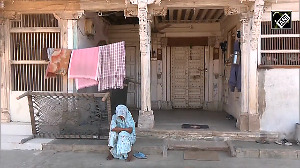On May 12th, over forty people died when violence broke out in Karachi between political factions supporting and opposing President Musharraf. Three days later, a suicide bomber entered a hotel restaurant in Peshawar and detonated the explosives strapped to his body, killing at least twenty persons.
Recent turbulence has renewed fears that Pakistan's nuclear weapons and materials may be vulnerable to breakdowns in command and control or theft. The good news is that these nightmare scenarios are unlikely to occur during the current political unrest. The bad news is that Pakistan's domestic unrest will continue and grow worse without the restoration of a representative government, and that extremists have many ways to further destabilise Pakistan.
Are Pakistan's bombs safe? In theory, Pakistan's nuclear weapons could be vulnerable to theft, illicit transfer, or unintentional use if the army's discipline and command and control structure faltered. Concerns about the security of Pakistan's weapons are greatest in the West when Pakistani politics enter a rough patch and during leadership changes.
Fortunately, these worst case scenarios are highly unlikely. Pakistan has been through worse passages of political unrest. Intimidation, politically-driven violence, and sectarian strife are all too common in Pakistani politics. If past experience is any guide, the current unrest will not lead to anarchy or chaos in Pakistan. The vast majority of Pakistanis desire a moderate and stable State, and the army has an institutional interest to prevent the breakdown of national authority and cohesion.
Pakistan's weapons were secure during previous periods of political instability, and they are likely to remain the most protected national assets during the current unrest. There are no signs of a breakdown in command and control in the Pakistan army.
After the security leakages associated with A Q Khan, Pakistan's military leadership took important steps to establish improved safety and security practices. Pakistan's military authorities and civilian leaders also established a robust nuclear command and control structure after testing weapons in 1998.
Today, the military's Strategic Plans Division devotes over 8,000 men, mostly undercover, to protecting Pakistan's weapons and fissile material. The Pakistani military is a highly capable and professional force. It is highly improbable that it would hand over its crown jewels to individuals or organisations that it cannot control during this period of unrest.
It is equally unlikely that terrorists would be able to steal Pakistani nuclear weapons or fissile material. It is true that the fiat of the Pakistani State is being challenged throughout Pakistan, and especially in the tribal regions bordering Afghanistan. In the most troubled regions, police and military forces are struggling to maintain order. However, the installations that house Pakistan's nuclear weapons and fissile material, as would be expected, are heavily guarded and among the most secure facilities in all of Pakistan.
Similarly, fears that the current unrest could lead to a takeover of the Pakistani government by extremists are also misplaced. Religious parties are an important element of Pakistani society, but their political clout remains limited. It is unlikely that religious parties could engineer a takeover of the Pakistani government, as they lack both the popular support and the military power that would be required. The political power of religious parties would be further diminished if General Pervez Musharraf would remove the shackles from the two major political parties in Pakistan that do not define themselves in religious terms.
Unfortunately, unfounded fears about Pakistan's nuclear weapons have obscured more pressing threats. Radiological terrorism in Pakistan, as elsewhere, is possible. To conduct an act of radiological terrorism, extremists would need to fashion a radiological dispersal device, RDD, which consists of little more than conventional explosives and radiological materials that can be found in laboratories and hospitals. Though an RDD would cause few deaths, it could contaminate a large swath of land and stretch Pakistan's emergency response capabilities.
Extremists, however, need not resort to RDDs to wreak havoc and instill fear. As recent bombings have illustrated, detonating conventional explosives in a crowded area suffices to cause extraordinary suffering.
With each bombing, President Musharraf's vision of an enlightened and moderate Pakistan seems more illusive. The unraveling of Musharraf's vision of enlightened moderation was not unpredictable. For far too long, Musharraf has avoided making hard choices on the most pressing problems which confront Pakistan -- on madrasa reform, militancy in Kashmir, the resurgence of the Taliban, and democracy.
Musharraf is now entering a critical period, and he faces very difficult choices about his future and the future of Pakistan. While most alarmist predictions about the security of Pakistan's nuclear weapons are unlikely to materialise, instability is likely to increase unless Musharraf redirects the Pakistani ship of state.
Alex Stolar is a Herbert Scoville Jr Peace Fellow at the Stimson Center's South Asia Program






 © 2025
© 2025